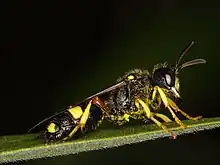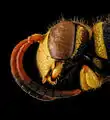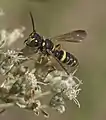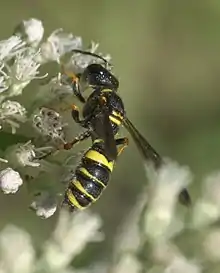| Cerceris | |
|---|---|
 | |
| Cerceris rybyensis | |
| Scientific classification | |
| Domain: | Eukaryota |
| Kingdom: | Animalia |
| Phylum: | Arthropoda |
| Class: | Insecta |
| Order: | Hymenoptera |
| Family: | Crabronidae |
| Tribe: | Cercerini |
| Genus: | Cerceris Latreille, 1802 |
| Type species | |
| Cerceris rybyensis (Linnaeus, 1771) | |
| Diversity | |
| at least 880 species | |
Cerceris is a genus of wasps in the family Crabronidae. It is the largest genus in the family, with over 1030 described species and subspecies.[1] The genus has a cosmopolitan distribution, with species on every continent.[2]
The adult female Cerceris wasp generally digs a nest in the soil and provisions it with living prey items she has paralyzed with venom.[3] The prey are usually beetles,[2] and sometimes bees.[3] Many Cerceris are solitary, but some species share nesting sites or nest communally.[2]
The faces of the females are frequently modified with unusual projections on the clypeus and the clypeal margin which can take the shape of conical bulges to elongated curving "horns". Paralyzed prey are carried in the females' mandibles, which are somewhat elongated and tend to have prominent teeth, often with species-specific shapes. The abdominal segments are also constricted very strongly at the junctures, giving the abdomen a somewhat corrugated, accordion-like appearance.
Gallery
 Cerceris triangulata
Cerceris triangulata
 Cerceris concinna
Cerceris concinna


See also
References
- ↑ Cerceris Catalog
- 1 2 3 Genaro, J. A. (2004). A new species of Cerceris from Hispaniola, West Indies (Hymenoptera: Crabronidae: Philanthinae). Journal of the Kansas Entomological Society 77(4) 761-64.
- 1 2 Alexander, B. A. and J. D. Asis. (1997). Patterns of nest occupancy and provisioning in Cerceris rufopicta Smith (Hymenoptera: Sphecidae). Journal of Insect Behavior 10(6) 871-93.
External links
- Hymis.de Photographs